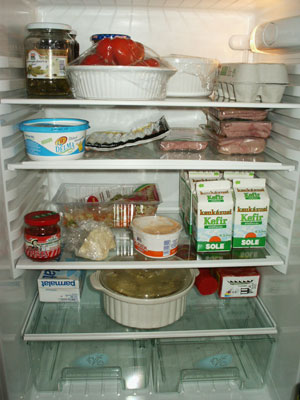

Posted: 2014-03-11 09:09:06

The CeBIT Exhibition takes place in Hanover this week and David Cameron has teamed up with Angela Merkel to endorse the exhibition and support an Anglo-German initiative to create some European mega enterprises that can challenge the likes of Google, Microsoft, Facebook, Twitter, et al.
In a speech on Sunday, Mr Cameron spoke about German and British companies working together to exploit the "internet of things".
When something like the "internet of things" starts moving into the politician's lexicon of buzz terms it is perhaps time to take a harder look and explore exactly what this means.
The Internet of Things (IoT) refers to a world where previously dumb things have intelligence and are connected by the internet to machines of greater intelligence in order to make decisions for the owners and free us from the drudgery of everyday existence.
The classic example is the fridge hooked up to the internet to tell the local supermarket that our milk is running low and it is time to send some more.
This sounds like it might be fabulous stuff, so is it realistic?
Well it reminds me very much of the much heralded paperless office at the end of the nineties / turn of the century.
It sounded, and still does sound, like a great idea and in many ways we are well on the way there, but the majority of businesses are still very short of fully achieving it despite many trying very hard.
The reason is very simple - the office can only be paperless when world is paperless.
You may decide to have a paperless office, but if customers, suppliers and government offices keep sending you paper then it can be a struggle to keep everything digitised.
Ultimately ditching paper will save a huge amount of time and cost for the economy, but the investments that need to be made in equipment, software and training to get there are too large a barrier and can only be dealt with over a protracted period of time.
The IoT is a bit like the paperless office in that the investment, operational and cultural barriers are huge. It will therefore take a very long time to fully come to fruition.
To see what I mean, let's go back in the fridge. If we want to the fridge to to tell the supermarket we need some more milk what is really required to make that happen? First we need an intelligent fridge. It will be linked by WiFi, or 4G/5G to the internet, but it must also be able to communicate with a range of different containers in the fridge.
These may be standard containers supplied by the fridge manufacturer, or else special containers supplied by the milk manufacturer. As we currently have a milk price war being carried out by the major supermarkets to get the price of four pints of milk down to a pound or below, it is safe to assume no one will want to start putting chips in their cheap plastic bottles.
This means the intelligent container will have to be part of the fridge. It will need to be removable because you will need to wash it as adding new milk on top of old milk will mean it will just go off straight away and this is bacteriologically unsafe anyway.
This suspiciously looks like more drudgery to me, not less.
Well, you will need an account with a supermarket who can supply a replacement. This seems ok as online shopping is pretty mainstream now.
However, when does the replacement get delivered? You just got your weekly groceries two days ago and now you have run out of milk? Are you going to pay for another delivery just for a bottle of milk?
Perhaps you should make sure you have enough milk for the week when the groceries are ordered. If you can estimate your milk usage that well over the course of a week, why do you need an intelligent fridge?
Alternatively, if the supermarkets change their delivery model and get in to the habit of dropping bits and bobs off, perhaps in return for a weekly delivery fee, how do you switch it off if you just decide this week you can do with less milk?
We already have a problem with too much food being bought and not used, will this new idea make this better, or worse?
Milk is easy to understand as it used by the majority of people every day - hence the supermarkets' focus on the price to the consumer. Less regular products are more difficult.
How do you assess whether the ham in the packet has run out, or even if you want another one?
What about one offs? Does everyone eat the same things every week? I hope not.
We may have a solution here in search of a problem.
The internet of things will make much more sense in the business world to begin with for store replenishments, or perhaps consumer applications such as electric cars - directing drivers to the nearest charging point when the battery is running low.
There is a long way to go on this - much work and much investment needed to fully exploit the Internet of Things and the general public does not even know if it wants it yet.
None of this is a reason to do nothing and the Anglo-German initiative should be applauded and supported. Who knows what may come out of it.
An intelligent British beer glass that fills itself with German beer might be worth a shot.
